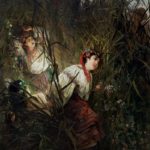The Indigo Villager’s Tippling Chanty (flung among throngs of the weeks-long Irish wake)
—an aspiring blue upon martins’ backs
or esurient roots unbound in budding blazes,
slavering gleam of lightfast, lustrous steel
that a simonizing star distilled
(on anemic wax’s phantom stroke
wanned theorists fear fresh children slash,
the eye-white smudge of a blunted crayon
across this palest page
to limn the corrupted jib
of a new-shorn sun
that singed the sky a suspicious cerulean,
chillingly alice blue, or the buttery hue of a chewn and chastised cuticle),
albeit from frigidly far-off hoarforth thrust
from a soundly browbeaten mountain’s haze—
what withe-tongued wench’s iris wrecked
and wrapped around blackening rapture’s heels;
wry hustling pulse of a mandrill’s rump,
wan glow of a swallowed and glaucous lump;
what cringing cherubic cheek cathects
this oenomel hue of a smoldering soul
and, annealed by the roiling smudge
of a spiraling martin’s back,
like a sapphire skipped across
greigely baying, sepulchral puddles
glib darkness claws, sopped soles redouble—
Rebuttals of bibulous briars’ bark!
“Know blue is blue, no blues apart
from martins’ backs or the gripple crabs
gaunt azure breakers sadly surrender,
abash’d and bedraggled hearts
or the chilblained tinder twisted in glistening veins,
the sputtering horseshoe’s blood exposed,
or blood that a swollen nose, some rusted jaw
shrill-lachrymose measures seized,
suspends in the blithering burden’s breath;
no air arresting, eddying pinions of
house martins
strident shrikes
must bloodlet—”
(blue that hydrangeas dredged with acerbic soils should blush with;
blue of the lead-eaten gums of a crazing painter cracked across chasms of canvas;
blue as the succulent berries bursting sweet and springly green as sage scrub;
blue as the indigo’d tabard tossed ‘cross caskets cradling spoondrift sloughed
from hessians born upon rank and piss-tinged soil, seduced by Samson’s sirens,
sloppily folded in oily pigments, scrubbed across sere and sunburnt skies;
glib blue of a shadow smeared across cross-eyed macadam,
that moon-licked tear uncurled around stiles of quietly quavering toes;
burnt blue of a man o’ war split against blistering, sea-tickled shins
or the blue of ballooning feasts for a sunfish;
blue of the stridulous cellist’s slanting song
that soothes the sea-bound schooner’s
slinkily whirligig, sunken struts;
frail blue of the thoughtless stripling’s nuts,
fey blue of the false and mismanaged blood;
old blue of belaboring burdens bravely balked,
of an envermeiled face’s scrunching threads
untethered from cramping scales and mudras,
no more assailed nor burdened by bludgeoning pulse or ablating breath,
bent blue as the shroud on a tragopan’s breast
that slackens and sprawls like a beckoning crank bait;
blue as a spy ring stymied by—
7 thoughts on "The Indigo Villager’s Tippling Chanty (flung among throngs of the weeks-long Irish wake)"
Leave a Reply
You must be logged in to post a comment.


There are so many good sounds here. I enjoyed reading it
Thank you! That’s very good to hear.
Yes! Read your first, wanted more, and this does not disappoint. You have a gift for sound.
Thank you! Much appreciated!
“Rebuttals of bibulous briars’ bark!” This is all quite blue.
This poem is really fantastic.
I love the title, but also every line is its own little poem. I think the theme really helps the reader to come along with you.
I know your meanings are quite layered and at times it’s possibly hard for the reader to see the bigger picture that you’re painting, even though you obviously see it quite clearly. Your imagination is simply gallavanting on such a unique plain…
I feel this one better, or think I do, and that’s enough. The longer you think on it, the more comes to mind. Sitting with your poems is often like gazing at a foreign painting from another time. It might take hours before some deeper understanding comes into focus. It helps to know you, and know how playfully and easily you romp with your imagination. I read this and think of the bluish purple irises dancing in the wake riot, and I love how the man o war is mentioned. This poem has such staying power, as all of your poetry does, but this one seems to provide a better footing for the initiate.
Thank you! That means more than I can mention here. And that’s a very poetic appreciation of my poem(s): poem stacking, writing poems to appreciate other poems — poems all the way down. I really liked when you compared something I wrote to this ridiculous dinner party littered with wildly unexpected events; I think about that every time I write something. I’ll now do the same with this: “like a foreign painting from another time.” Your appreciation and support means more than anyone’s, so thank you! Also, you should be writing more poems.